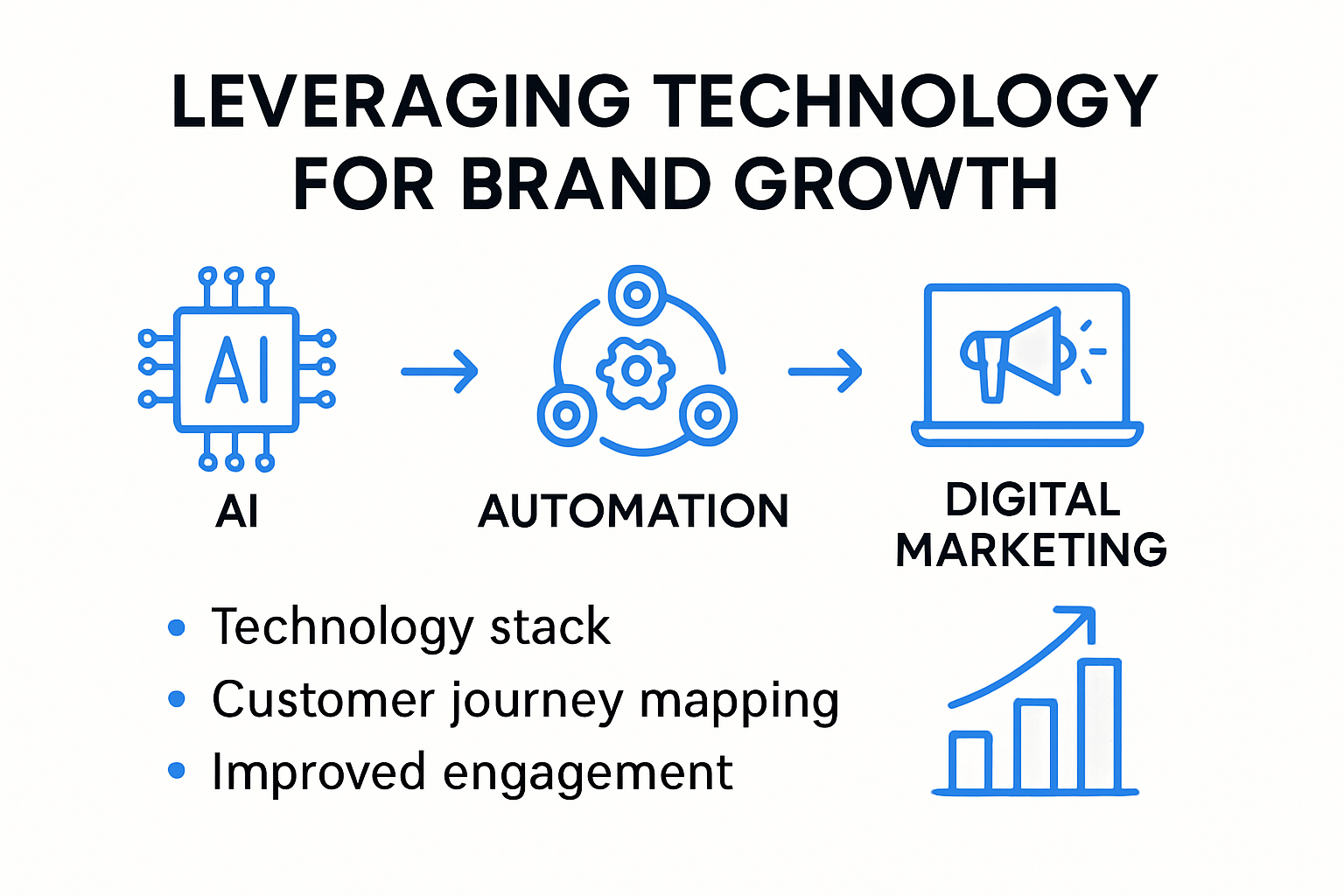Building a strong online brand has never mattered more for South African businesses. The facts are staggering. Companies with a differentiated digital identity are 60% more likely to attract and retain customers. But hold up. Almost everyone is talking about flashy logos and fancy websites. The real growth secret lies in finding and telling a story that makes people actually care about your brand, not just notice it.
Table of Contents
- Defining Your Unique Online Brand Identity
- Crafting A Strong Digital Presence For 2025
- Leveraging Technology For Brand Growth
- Measuring And Improving Online Brand Performance
Quick Summary
| Takeaway | Explanation |
|---|---|
| Define your brand identity clearly | Identify your unique value proposition to differentiate from competitors and attract customers effectively. |
| Create consistent digital engagement | Maintain unified messaging across all digital channels to enhance user retention and engagement. |
| Leverage AI for personalized experiences | Use technology to tailor interactions and create dynamic content based on customer behaviour and preferences. |
| Measure brand performance comprehensively | Employ advanced analytics to track engagement quality and conversion efficiency for ongoing strategic refinement. |
| Adopt a holistic technology integration approach | Ensure your technological solutions align with business objectives and foster meaningful customer relationships. |
Defining Your Unique Online Brand Identity
Building an online brand requires strategic thinking and a deep understanding of what makes your business truly distinctive. Your digital identity is more than a logo or website - it represents the core personality and values that set you apart in a competitive marketplace.
Understanding Brand Positioning
Successful brand positioning starts with identifying your unique value proposition. This means critically examining what differentiates your business from competitors. Research from Harvard Business Review suggests that businesses with a clear, differentiated identity are 60% more likely to attract and retain customers.
Consider these critical elements when defining your brand identity:
- Authentic Voice: Develop a communication style that genuinely reflects your company’s personality and values
- Visual Consistency: Create a cohesive visual language across all digital platforms
- Emotional Connection: Design brand messaging that resonates with your target audience’s aspirations and challenges
To help clarify the critical elements of brand identity, here’s a summary table outlining their role and importance:
| Element | Role in Brand Identity | Importance |
|---|---|---|
| Authentic Voice | Reflects company’s personality & values | Builds trust and relatability |
| Visual Consistency | Ensures cohesive visuals across digital platforms | Enhances brand recognition |
| Emotional Connection | Resonate with target audience’s aspirations & challenges | Deepens loyalty and customer engagement |
Crafting a Compelling Digital Narrative
Your online brand narrative should tell a story that goes beyond product features. It needs to communicate why your business exists and how you solve real problems for customers. Nielsen Norman Group research indicates that brands using narrative techniques experience 22% higher engagement rates.
Key strategic approaches include:
- Highlighting your company’s mission and core values
- Sharing customer success stories that demonstrate tangible impact
- Creating content that provides genuine value and insights
Digital Brand Architecture
Brand architecture involves systematically developing your online presence across multiple channels. This means ensuring your brand feels consistent yet adaptable across websites, social media, email communications, and digital advertising. Our comprehensive guide on creating a strong branding statement offers deeper insights into developing a robust digital brand strategy.
Successful digital brand architecture requires:
- Unified messaging across all platforms
- Responsive design that maintains brand integrity
- Regular monitoring and refinement of your digital brand experience
Remember that building an online brand is an ongoing process of understanding your audience, communicating your unique value, and consistently delivering on your brand promise. Your digital identity should evolve with your business while maintaining its core essence.
The most memorable brands are not just selling products - they are creating meaningful connections that transcend transactional relationships. By investing time and strategic thought into defining your unique online brand identity, you position your business for sustainable growth and customer loyalty.
Crafting a Strong Digital Presence for 2025
Digital presence has evolved from a mere optional strategy to a critical business imperative in 2025. Businesses must now approach their online ecosystem with precision, strategic thinking, and an understanding of emerging technological trends that reshape digital interactions.
Strategic Digital Infrastructure
Building a robust digital presence requires more than a static website. According to Gartner Research, companies that integrate comprehensive digital strategies are 3.5 times more likely to report significant business growth.
Key components of a strong digital infrastructure include:
- Responsive Design: Ensuring seamless user experience across multiple devices and platforms
- Performance Optimization: Creating fast, efficient websites that load quickly and provide smooth navigation
- Security Protocols: Implementing advanced cybersecurity measures to protect user data and build trust
Multi Channel Digital Engagement
Modern digital presence demands a sophisticated, integrated approach to online engagement. Research from McKinsey & Company highlights that businesses with omnichannel strategies achieve 91% greater year-over-year customer retention rates compared to those with fragmented digital approaches.
Effective multi channel strategies involve:
- Creating consistent brand messaging across social media, websites, and digital platforms
- Developing interactive content that encourages user participation
- Utilizing data analytics to understand and predict customer behaviour
Future Oriented Digital Ecosystem
Digital presence in 2025 is about anticipating and adapting to technological shifts. Our comprehensive guide on digital marketing channels provides deeper insights into emerging digital strategies.
Forward thinking digital ecosystems should focus on:
- AI and machine learning integration
- Personalised user experiences
- Adaptive content strategies that respond to real time user interactions
Successful digital presence is no longer about having an online footprint - it’s about creating a dynamic, intelligent digital environment that evolves with technological innovations and user expectations. Businesses must view their digital strategy as a living, breathing entity that requires constant nurturing, monitoring, and strategic refinement.
The most successful digital presences will be those that combine technological sophistication with genuine human connection, transforming digital interactions from transactional experiences to meaningful engagements that resonate with users on multiple levels.
Leveraging Technology for Brand Growth
Technology has become the primary catalyst for brand growth in 2025, transforming how businesses connect, engage, and expand their market presence. Strategic technological integration is no longer optional but a fundamental requirement for sustainable business development.

Artificial Intelligence and Personalization
Research from Accenture reveals that organizations successfully implementing AI technologies experience 38% faster innovation cycles and 45% improved customer engagement. Artificial intelligence enables businesses to create hyper-personalized experiences that adapt in real-time to customer preferences.
Key AI-driven strategies include:
- Predictive Customer Insights: Using machine learning algorithms to anticipate customer needs
- Automated Customer Interactions: Implementing intelligent chatbots and virtual assistants
- Dynamic Content Personalization: Tailoring digital experiences based on individual user behaviour
The following table summarizes the business impact of key AI-driven strategies mentioned, providing a quick reference to their purpose and benefits:
| AI-Driven Strategy | Purpose | Impact on Business |
|---|---|---|
| Predictive Customer Insights | Anticipate customer needs with algorithms | Improves targeting & satisfaction |
| Automated Customer Interactions | Use chatbots & virtual assistants | Enhances efficiency & availability |
| Dynamic Content Personalization | Tailor experiences based on behaviour | Increases engagement & loyalty |
Advanced Digital Marketing Technologies
According to a comprehensive study by Harvard Business Review, emerging technologies are revolutionizing digital marketing approaches. Businesses can now leverage sophisticated tools that provide unprecedented insights and automation capabilities.
Critical technological marketing innovations involve:
- Generative AI for content creation
- Advanced data analytics platforms
- Immersive augmented reality marketing experiences
Strategic Technology Integration
Our comprehensive guide on leveraging technology for business growth provides deeper insights into developing a robust technological strategy.
Successful technology integration requires:
- Continuous learning and skill development
- Ethical considerations in technological implementation
- Flexible infrastructure that supports rapid technological adaptation
The most progressive businesses recognize that technology is not just a tool but a strategic partner in brand growth. By embracing intelligent, adaptive technological solutions, companies can create more meaningful, responsive, and dynamic customer relationships.
Effective technological leverage goes beyond implementing cutting-edge tools - it demands a holistic approach that aligns technological capabilities with core business objectives, human creativity, and evolving customer expectations. The future belongs to organizations that can seamlessly blend technological sophistication with genuine human connection.
Measuring and Improving Online Brand Performance
In the rapidly evolving digital ecosystem of 2025, measuring and improving online brand performance has become a sophisticated, data-driven discipline that demands precision, strategic insight, and continuous adaptation.
Performance Metrics and Analytics
Research from Harvard Business Review demonstrates that businesses using advanced analytics frameworks are 3.7 times more likely to achieve significant growth. Modern brand performance measurement goes far beyond traditional metrics, incorporating complex multi-dimensional assessment strategies.
Key performance indicators for online brand effectiveness include:
- Engagement Quality: Measuring depth and authenticity of customer interactions
- Brand Sentiment Analysis: Tracking emotional responses and perceptions across digital platforms
- Conversion Efficiency: Evaluating the transformation of digital interactions into tangible business outcomes
Here’s a quick comparison table of core online brand performance metrics and what they reveal about brand health:
| Performance Metric | What It Measures | Insights Provided |
|---|---|---|
| Engagement Quality | Depth/authenticity of interactions | Customer loyalty & active participation |
| Brand Sentiment Analysis | Emotional responses across platforms | Public perception & areas for improvement |
| Conversion Efficiency | Digital interactions → business outcomes | Effectiveness of digital strategy |
Strategic Performance Optimization
According to a comprehensive study published in the International Journal of Digital Marketing, successful brands develop dynamic performance improvement frameworks that integrate multiple data sources and predictive modeling techniques.
Critical optimization strategies involve:
- Continuous learning from performance data
- Implementing agile feedback loops
- Developing adaptive digital marketing approaches
Holistic Brand Performance Ecosystem
Our comprehensive guide on improving brand credibility provides deeper insights into creating a robust performance measurement strategy.
Comprehensive brand performance management requires:
- Advanced data integration technologies
- Cross-platform performance tracking
- Ethical data utilization and privacy considerations
Successful online brand performance is not a static achievement but a dynamic, ongoing process of strategic refinement. Businesses must view their digital performance as a living ecosystem that demands constant nurturing, intelligent analysis, and proactive adaptation.
The most successful organizations recognize that performance measurement is not just about collecting data but about generating meaningful insights that drive strategic decision-making. By developing a holistic, intelligent approach to brand performance, businesses can transform raw data into a powerful competitive advantage, creating digital experiences that are not just measurable, but truly remarkable.

Frequently Asked Questions
What is the importance of a unique online brand identity for businesses in 2025?
A unique online brand identity helps businesses differentiate from competitors, build customer loyalty, and increase engagement, making them 60% more likely to attract and retain customers.
How can technology be leveraged to enhance brand growth in 2025?
Businesses can leverage technology by using AI for personalized customer experiences, advanced digital marketing tools to automate engagement, and integrating data analytics to refine marketing strategies.
What are the key performance metrics for measuring online brand effectiveness?
Key metrics include engagement quality (depth of interactions), brand sentiment analysis (emotional responses), and conversion efficiency (transforming interactions into business outcomes).
How can companies create a compelling digital narrative for their brand?
Creating a compelling digital narrative involves highlighting your mission and core values, sharing customer success stories, and providing valuable content that addresses customer needs.
Unlock the Power of Your Online Brand in 2025
Real growth requires more than a striking logo or website. As outlined in this article, the real challenge is building a digital brand that stands out, tells your story, and keeps customers coming back. Many South African businesses struggle to create a unified digital identity that actually connects with their audience. If scattered messaging, inconsistent visuals, or outdated platforms are holding you back, your brand could easily get lost in the crowd. Your competitors are already investing in clear brand positioning, AI-driven user experiences, and performance metrics that lead to long-term loyalty and increased conversions.
Take the first step towards a powerful digital presence with tailored solutions that support every stage of your journey. Cloudfusion offers bespoke web design and development that brings your unique brand narrative to life. Explore our industry-specific strategies and see how our technical expertise and holistic marketing can close the gap between where you are and where you want to be. Ready to transform your digital identity into a growth engine? Visit Cloudfusion now for your custom quotation and claim your place at the forefront of business in 2025.








